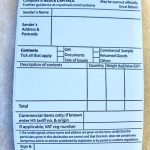Britons buying from EU websites hit with £100 customs bills
British shoppers who bought items from European websites are facing post-Brexit demands of more than £100 in import duties that must be paid before parcel firms will deliver the items.
Despite claims by Boris Johnson that there would be tariff-free trade after the Brexit transition period ended on 31 December, consumers who bought items from EU websites are being chased for import duties, VAT and admin fees – which, they say, render the purchase uneconomic.
Lisa Walpole, from Norfolk, has been told she must pay £121 to the parcels firm UPS for a £236 clothes order she made from the Norwegian website Onepiece.com, which specialises in premium jumpsuits. At the time of the order the company had promised free international delivery.
Helen Kara, from Uttoxeter in Staffordshire, faced a UPS demand for £93 after purchasing £292 worth of bed linen from Urbanara.co.uk, which is based in Berlin, a fact she was unaware of when ordering.
Since 1 January, people buying goods from the EU – and vice versa – have faced import charges. The new rules have put thousands of specialist online businesses at risk as consumers on both sides of the Channel balk at having to pay the hefty import fees.
The UK government says European companies supplying goods valued at up to £135 direct to British buyers are supposed to collect VAT at the item’s prevailing rate – in most cases 20% – at the point of purchase. The move was branded “ludicrous” by Assen-based Dutch Bike Bits, which is among the firms that has halted all sales to the UK.
Online marketplaces such as Amazon collect the VAT on the retailer’s behalf and the item from Europe can be sent as before. However, UK consumers who have ordered items direct have been hit by the charges.
In one case the Guardian is aware of, a £35 order for running gear attracted a £20.59 demand by the courier before it could be delivered.
UK-based buyers placing orders of more than £135 with European websites also face having to pay import duties.
One of the problems consumers face is working out what duties are due, because the rate depends on the type of goods and their source.
The unexpected bill for Kara’s bed linen order, since refunded by the website, was made up of £19.81 in duty, £61.32 in VAT and an £11.50 collection fee levied by the courier firm.
“I had no idea that I was not ordering from a UK company,” she said. “Only when I received the duties demand did I realise that the site was based in Germany. I wouldn’t have done it if I’d known I would face 30% duties on top.”
Walpole was similarly bemused to receive her import bill, particularly as she had checked the Onepiece website which clearly – but wrongly – stated that no custom charges would be applied to UK deliveries.
A mistake by the delivery driver, who was new to the job, meant her onesies were delivered before she had paid the fee.
“The next day the usual UPS courier came back to give me an invoice of £121.67 customs charges. I asked if this was because of Brexit and he told me that they had loads of additional paperwork and charges. I felt bad for him when he said couriers such as him were held accountable if they did not collect these charges.”
Sign up to the daily Business Today email or follow Guardian Business on Twitter at @BusinessDesk
The paperwork shows UPS invoiced her £81.85 for “import VAT”, £28.32 in duties and the £11.50 admin fee, although in her case Onepiece has since said it will refund the extra charges.
“I have no idea whether these sums are correct. By my calculation I appear to have paid 34% VAT, which can’t be right,” she said.
A HMRC spokesperson said: “The value of the import VAT is calculated based on the value of the goods for customs purposes plus any customs duty, therefore it may appear to be higher than 20% of the original sales price.”



